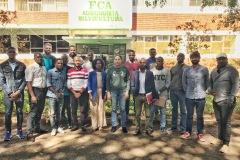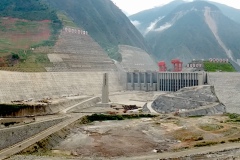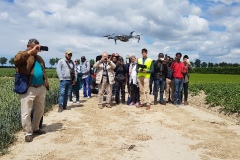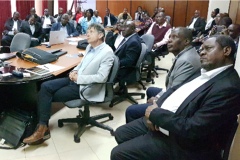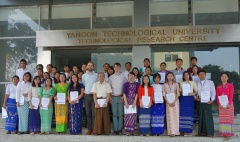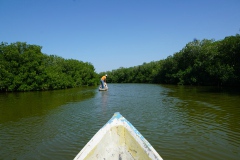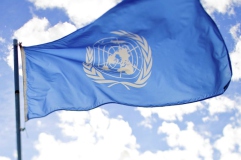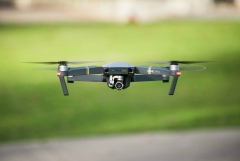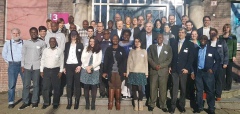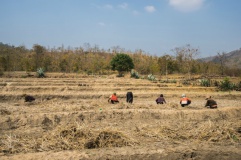Categorie: Uncategorized
9 juli 2018
FutureWater gives Remote Sensing and Agricultural Services Course in Angola
The Government of Angola is developing a policy to diversify the country’s economy, strongly dependent on the income of the oil sector. Agriculture is considered one of the priority sectors to be developed. A favorable climate and a relatively high availability of water resources and fertile soils, can lead Angola to become one of the...
5 juli 2018
Mekong State Of the Basin Report 2018: FutureWater prepares Upper Mekong Chapters
The Mekong State Of the Basin Report (SOBR) is published by the Mekong River Commission (MRC) every five years, in advance of the cyclic updating of the Basin Development Strategy. The SOBR plays a key role in improving monitoring and communication of conditions in the Mekong Basin, and is MRC’s flagship knowledge and impact monitoring...
21 juni 2018
FutureWater and HiView give lectures on the use of flying sensors
Last week FutureWater, together with its partner HiView, gave 2 days of lectures at IHE Delft Institute for Water Education, which partners with UNESCO. As part of their master degree, around 25 students were taught on the theory behind flying sensors (also known as drones), the different types of applications and how to use them...
1 mei 2018
Seminar on the use of flying sensors in agriculture held in Kenya
In a bid to create and increase more awareness on the use of flying sensors (drones) in agriculture, FutureWater and HiView, held a seminar on March 2, 2018 at the KALRO (Kenya Agricultural & Livestock Research Organization) Headquarters in Nairobi, Kenya. The seminar was attended by KALRO researchers, representatives of SNV, government employees, as well...
12 april 2018
Training on Google Earth Engine for water resource analysis organized in Myanmar
Last month, the training Cloud computing for water resource analyses in Myanmar using Google Earth Engine, executed by FutureWater and HKV, was successfully conducted at Yangon Technological University (YTU), Yangon, Myanmar. The training was organized in the framework of the Leapfrogging Delta Management in Myanmar, led by Delft University of Technology (TU Delft) and funded...
3 april 2018
Third HERMANA project mission to present beta version of the Water Management Information Center
From 5 to 9 March 2018, staff people of the HERMANA project presented the first version of the Water Management Information Center (WMIC) for the Cauca Valley Basin at the CVC headquarters in Cali, Colombia. This information center aims to be the cornerstone for supporting the decision-making process at the technical and institutional levels in...
22 maart 2018
FutureWater onderzoek aangehaald in Verenigde Naties rapport
Vandaag, 22 maart 2018, is Wereld Water Dag. In Nederland minder bekend, maar vooral in Afrika en Azië is 22 maart een dag waar water nog eens extra onder de aandacht wordt gebracht. Het thema van dit jaar is “natuur voor water”: de mogelijkheden die natuur biedt voor het oplossen van wereldwijde waterproblemen. In het...
9 maart 2018
ThirdEye maakt drone-technologie toegankelijk voor Afrikaanse boeren
In Nederland spelen drones al een belangrijke rol in de landbouw: vanuit de lucht kunnen zij zeer precies de groei van gewassen monitoren. Hierbij wordt gebruik gemaakt van hoogwaardige sensoren en relatief dure drones. Dankzij deze sensoren kan met speciale software precies worden berekend welke verzorging (bv. water, kunstmest of gewasbeschermingsmiddelen) is vereist. “Een fantastische...
15 februari 2018
New Horizon 2020 project TWIGA officially started
Last week the kick-off meeting took place of a new Horizon 2020 project TWIGA; Transforming Water, weather, and climate information through In situ observations for Geo-services in Africa. The project aims to provide actionable geo-information on weather, water, and climate in Africa through innovative combinations of new in situ sensors and satellite-based geo-data. With the...
1 februari 2018
New IMPREX policy brief: EU’s vulnerability to climate change impacts outside its borders
Climate change is leading to increased water scarcity and drought in many parts of the world. This has implications for the European Union (EU) because a lot of the goods consumed or used in the EU are produced abroad. This makes its economy dependent on water resources from beyond its borders. As part of the...
